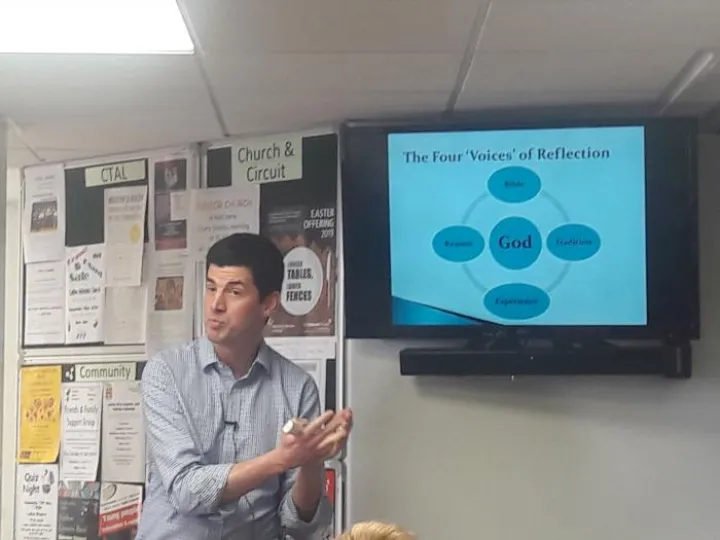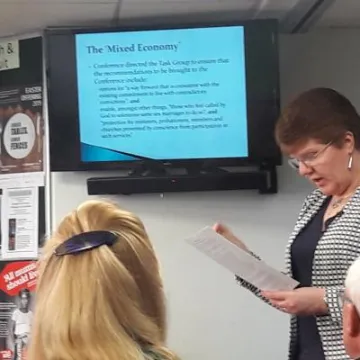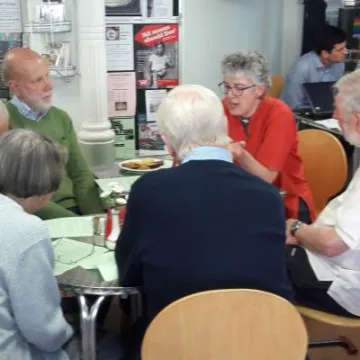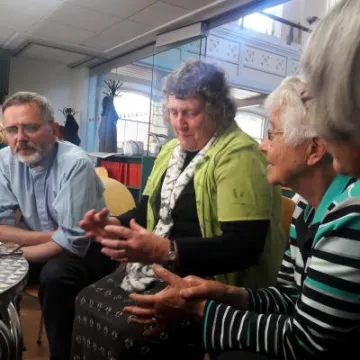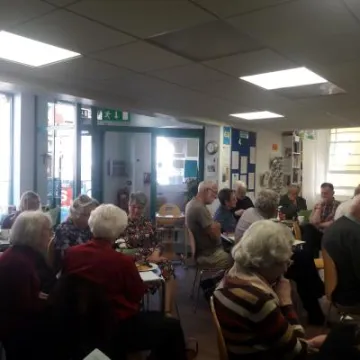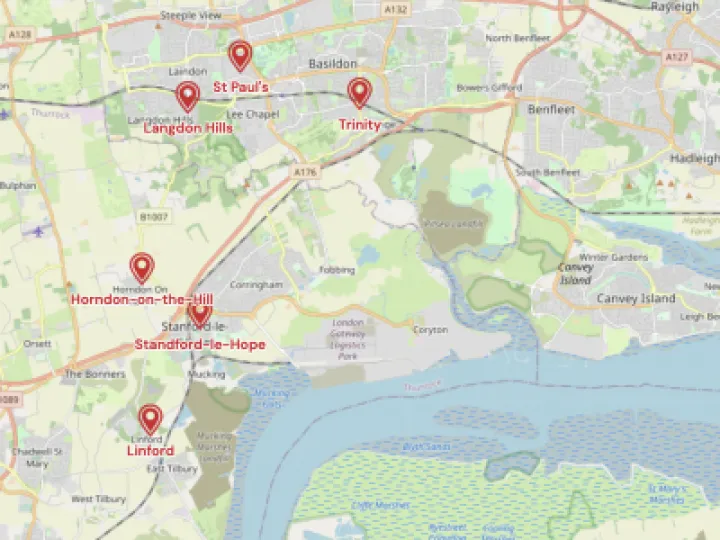Courageously Conversing on Marriage and Relationships
In the run-up to the decision of the Methodist Church in Britain's position on Civil Partnerships and same sex marriages, the District has hosted a number of opportunities welcoming people of differing perspectives to "open the Bible together; look back over what the Church has said and done regarding Marriage and Relationships; consider what it means for us to be a people living with contradictory convictions and prepare for further conversations in 2019/20." The last of these, ahead of tomorrow's (May 14th) report from the Conference 2018 Task Group on Marriage and Relationships, took place yesterday at Ludlow Methodist Church.
Led by Deacon Eunice Attwood and Revd. Jonathan Dean of the Queen's Foundation for Ecumenical Theological Education, the various around the table conversations between participants were supported by Deacon Attwood and Revd. Dean providing the historical context of the Connexion's commitment to keeping Marriage and Relationships high on the agenda in an atmosphere which encourages debate.
The conversations commenced with reference to the 'Derby' Declarations, the 1993 Conference resolutions on human sexuality:
1. The Conference, affirming the joy of human sexuality as God's gift and the place of every human being within the grace of God, recognises the responsibility that flows from this for us all. It therefore welcomes the serious, prayerful and sometimes costly consideration given to this issue by The Methodist Church.
2. All practices of sexuality, which are promiscuous, exploitative or demeaning in any way are unacceptable forms of behaviour and contradict God's purpose for us all.
3. A person shall not be debarred from church on the grounds of sexual orientation in itself.
4. The Conference reaffirms the traditional teaching of the Church on human sexuality; namely chastity for all outside marriage and fidelity within it. The Conference directs that this affirmation is made clear to all candidates for ministry, office and membership, and having established this, affirm that the existing procedures of our church are adequate to deal with all such cases.
5. The Conference resolves that its decision in this debate shall not be used to form the basis of a disciplinary charge against any person in relation to conduct alleged to have taken place before such decisions were made.
6. Conference recognises, affirms and celebrates the participation and ministry of lesbians and gay men in the church. Conference calls on the Methodist people to begin a pilgrimage of faith to combat repression and discrimination, to work for justice and human rights and to give dignity and worth to people whatever their sexuality.
The Conference thereby acknowledged the diversity of interpretations and range of understandings about intimate relationships and encouraged Methodists to "continue to discuss these differences in a spirit of openness and love...to combat repression and discrimination, to work for justice and human rights and to give dignity and worth to people whatever their sexuality."
The 2005 Conference Report on the 'Pilgrimage of Faith', details of the 2007 Review of the 1993 Resolutions on Human Sexuality and details of the 2013 Consultation on same sex marriage and civil partnerships are available to view on the Methodist Church in Britain website here.
The 2018 Conference directed the Marriage and Relationships Task Group to bring a report to the Conference in 2019 setting out a number of theological arguments and recommendations concerning the most pressing issues in the Church's understanding of relationships and marriage. The Conference also adopted a Notice of Motion which directed the Task Group to ensure that the recommendations to be brought to the Conference include options for "a way forward that is consistent with the existing commitment to live with contradictory convictions" and enable, amongst other things, "those who feel called by God to solemnise same sex marriages to do so" and "protection for ministers, probationers, members and churches prevented by conscience from participation in such services".
There were several comments in the debates at the Conference that, despite numerous opportunities over many years for consultation about the Church's understanding of relationships and marriage, many individuals and local churches had not engaged much in discussion of the pressing issues. The Task Group is keen to encourage such conversations in every part of the life of the Church in this current connexional year, leading up to the Task Group's presentation of its report to the Conference in 2019. During debates at the 2018 Conference, there were several comments in the debates that, despite numerous opportunities over many years for consultation about the Church's understanding of relationships and marriage, many individuals and local churches had not engaged much in discussion of the pressing issues.
The Marriage and Relationships Task Group prepared a model statement on Living with Contradictory Convictions:
- We continue to believe that God has been revealed in Jesus Christ, accept Jesus Christ as our Lord and Saviour, and live in communion with God and in the power of the Holy Spirit.
- We cherish our place within Christ's Church recognising that it is Christ alone who chooses, calls and confirms us as members of His church, the body of Christ.
- Whilst we may not all agree about everything, we recognise the importance of the truths which bind us together as well as the issues which currently divide us.
Therefore, we resolve:
- To engage with each other openly, honestly, prayerfully and graciously
- To treat each other with respect and dignity, recognising the sincerity of the faith of those who may see things differently
- To seek to learn from one another as we travel together as fellow pilgrims
- To renounce all language and behaviours that attempt to coerce others to change their views or beliefs.
- To seek, as far as conscience allows, to preserve the fellowship of Christ's Church.
- To unite under the authority of scripture as we seek live as authentic Christian disciples in our own generation.
Deacon Attwood and Revd. Dean suggested an approach to engaging in these conversations proposing four "voices" to be listened to, to aid personal reflection on and ensuing discussions of the issues:
THE BIBLE – as the word of God, speaks to us in different voices and differing perspectives. We may be clear about the authority of the Bible but acknowledge it is a difficult document to refer to.
TRADITION – The Church Creeds; this is a voice that is also rich, deep and broad. As such it requires prayerful wisdom.
EXPERIENCE – What does our story, our experience and the stories and experience of others tell us?
REASON – Common Sense; God has given us brains which he expects us to use.
Deacon Attwood advised that "Listening to these voices is important in tackling issues of our faith particularly when they are contentious, or they cause division." Using as example the question of whether Christians should or should not go to war, Deacon Attwood demonstrated how using the four voices model conclusions from common sense thought might readily conflict with and contradict conclusions from, for example, church creeds. Equally, discussions on Marriage and Relationships will throw up myriad conflicting and contradictory conclusions as well as grey areas. Will the distinction between those who are ordained and those who are not remain? What language will we use, for example the continuing use of "prayers" rather than "blessing" for marriages which we have already solemnised?
Demonstrating the form a four voices reflection might take, Deacon Attwood proposed that. Citing Genesis 2:24's "one flesh" union being specifically a covenant between man and woman, Genesis 19:6's reference to sex between men as "wicked" and 1 Corinthians 6 -7 on marriage and fornication, she suggests the Bible is against same sex marriage. Revd. Dean, interjecting that these are among scripture that have been exercised by the church over time, pointed out that some Old Testament texts provide an understanding of marriage which would not be entirely understood today, for example the treatment of women as possessions. Hence the notion of a biblical model of marriage is in and of itself a difficult concept to define.
Revd. Dean referenced the same sex relationships between David and Jonathan, the sexual ambiguity in the account of the centurion's relationship with his servant whom he loves, Jesus and John at the last supper which he opined as very intimate (though perhaps not sexual) relationship and as such confirm that within these conversations we are "dealing with some complicated moral working out." He asked that we "Remember the background of the New Testament scriptures. We're not talking about a world where our meaning of same sex marriage exists".
In considering tradition and biblical family values, Deacon Attwood noted that the Church does not deny same sex attraction but that some believe those in such relationships should remain celibate. "Tradition" she said, "is behind those sorts of views." Revd. Dean added, "The Church has believed these things for a very long time, it hasn't been particularly counter-cultural." He said care must be taken about Old Testament views of marriage and the "sweeping statements that we have always said about marriage. There are questions about how well as a church we reflect the world we are in and how much we are counter-cultural. He also acknowledged the Church's consistency in its teaching that marriage is "natural" between man and woman for having and raising children and asked participants to consider, "Can the church have been wrong for so long about anything? If we change the definition of marriage, we are not the whole church" – There are global ramifications.
"Through reason we now realise that people do not choose who they are attracted to and experience is a very strong consideration." Deacon Attwood said. "It is hard to imagine what it is like to be somebody else. If we're heterosexual and in a good marriage, people do not want to belittle that institution... How do we help our children choose their lifestyles? People are yearning for a different approach to sexuality, something we need to be attentive to." She went on to point out that contrary to the discrimination and violence some same sex couples face, same sex attraction, dated and cited in ancient writings, is an affirmation of all sexuality and that same sex relationship is something to be celebrated.
The crux though, and what is hoped will result from Courageous Conversations on Marriage and Relationships, Deacon Attwood stated is that "As Christian people we disagree but how to disagree well has never been more important than it is now. If the church can show the world what it is to disagree well, carefully, openly we might be able to show them a glimpse of the Kingdom of God."
Chair of the District Revd. Rachel Parkinson closed the meeting. She is hopeful that through these conversations all Methodists feel enfranchised. She said this was an opportunity to, "Say something about a church to the world around us. Living with differences it is very possible for me to have different views to someone but that doesn't stop us worshipping together."
"Do not allow yourself one thought of separating from your brothers and sisters, whether their opinions agree with yours or not." John Wesley.
Quick Links
Get In Touch
c/o The Methodist Centre
Lansdowne Road
Bayston Hill
Shrewsbury
SY3 0HZ

